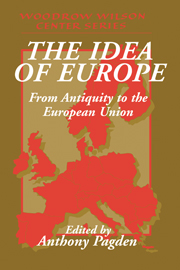Book contents
- Frontmatter
- Contents
- Acknowledgments
- Introduction
- 1 Europe: Conceptualizing a Continent
- 2 Some Europes in Their History
- 3 “Europe” in the Middle Ages
- 4 The Republican Mirror: The Dutch Idea of Europe
- 5 The Napoleonic Empire and the Europe of Nations
- 6 Homo Politicus and Homo Oeconomicus: The European Citizen According to Max Weber
- 7 The European Self: Rethinking an Attitude
- 8 European Nationalism and European Union
- 9 From the Ironies of Identity to the Identities of Irony
- 10 Muslims and European Identity: Can Europe Represent Islam?
- 11 The Long Road to Unity: The Contribution of Law to the Process of European Integration since 1945
- 12 The Euro, Economic Federalism, and the Question of National Sovereignty
- 13 Identity Politics and European Integration: The Case of Germany
- 14 Nationalisms in Spain: The Organization of Convivencia
- 15 The Kantian Idea of Europe: Critical and Cosmopolitan Perspectives
- Contributors
- Index
- Cambridge Cultural Social Studies
14 - Nationalisms in Spain: The Organization of Convivencia
Published online by Cambridge University Press: 14 July 2009
- Frontmatter
- Contents
- Acknowledgments
- Introduction
- 1 Europe: Conceptualizing a Continent
- 2 Some Europes in Their History
- 3 “Europe” in the Middle Ages
- 4 The Republican Mirror: The Dutch Idea of Europe
- 5 The Napoleonic Empire and the Europe of Nations
- 6 Homo Politicus and Homo Oeconomicus: The European Citizen According to Max Weber
- 7 The European Self: Rethinking an Attitude
- 8 European Nationalism and European Union
- 9 From the Ironies of Identity to the Identities of Irony
- 10 Muslims and European Identity: Can Europe Represent Islam?
- 11 The Long Road to Unity: The Contribution of Law to the Process of European Integration since 1945
- 12 The Euro, Economic Federalism, and the Question of National Sovereignty
- 13 Identity Politics and European Integration: The Case of Germany
- 14 Nationalisms in Spain: The Organization of Convivencia
- 15 The Kantian Idea of Europe: Critical and Cosmopolitan Perspectives
- Contributors
- Index
- Cambridge Cultural Social Studies
Summary
If any single detail lends sense to the general theory of nationalism, it is a consciousness of the close connection between nationalist movements and ideologies within the framework of similar historical junctures and interconnected geographical and political spaces. This fact stands out even more prominently in the case of nationalisms born and developed within the limits of a single state. On a general level, Spanish nationalism has a long history with many complex precedents, as befits a society that emerged as a nation-state in the early-modern period. Since 1898, however, the course of Spanish nationalism has been inseparable from its relations with the Basque and Catalan regionalist movements that consolidated and evolved into nationalist movements after the beginning of the twentieth century. The principal political problem in Spain since the reestablishment of democracy in 1976 has been organizing convivencia (peaceful coexistence) among the different national consciences existing within a state immersed in the general process of European integration.
The need to observe carefully the complex relationship between the national consciences and realities of Spain has been obstructed on occasion by a reductionist vision that tends to devalue the common political nation and to emphasize Spain's privileged cultural nationalities. The rebirth of nationalism in Central and Eastern Europe has reinforced the focus of recent studies of nationalism on those manifestations of the phenomenon that originate in ethno-linguistic communities with political aspirations in conflict with the states of which they form a part.
- Type
- Chapter
- Information
- The Idea of EuropeFrom Antiquity to the European Union, pp. 317 - 330Publisher: Cambridge University PressPrint publication year: 2002

